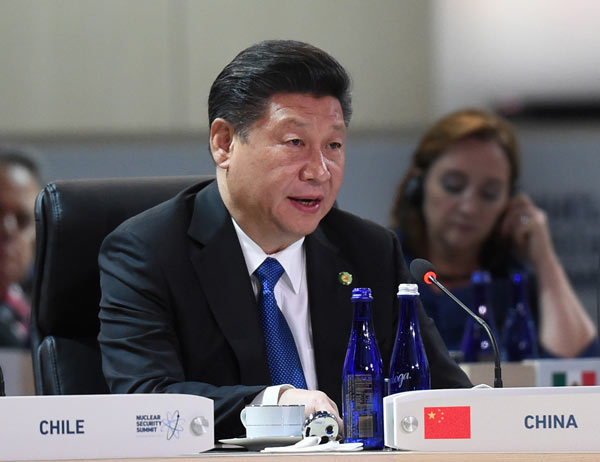A matter of nuclear responsibility
Updated: 2016-04-09 09:11
By Shen Dingli(China Daily)
|
||||||||
 |
|
President Xi Jinping delivers a speech at the opening plenary of the fourth Nuclear Security Summit (NSS) in Washington DC, the United States, on April 1, 2016. Provided to China Daily |
President Xi Jinping's recent visit to the Czech Republic and participation in the fourth Nuclear Security Summit in Washington once again highlighted China's sense of principle and responsibility.
Czech President Milos Zeman was among the Central European leaders who attended China's military parade on Sept 3, 2015, to commemorate the 70th anniversary of the victory of the war against fascism and Japanese aggression. About 50 heads of state and international organizations graced the occasion, although unfortunately many countries, led by the world's superpower, skipped the event.
To the credit of the Czech Republic, it has also retained its independent foreign policy in spite of its new identity as a NATO member. Besides, Prague acknowledges Beijing's role in defeating the fascists in the Far East.
Prague's insistence on following an independent foreign policy has earned it the respect of Beijing, and Xi's visit to the Czech Republic despite his tight diplomatic schedule shows that.
The two sides' shared values of fighting fascism and the importance they attach to economic cooperation have helped strengthen mutual trust and strategic partnership. In fact, China has been able to deepen ties with many countries over the past decades, because it promotes mutually beneficial partnerships and offers public goods - and a strategic partnership with tangible benefits and shared values lasts long. That's why the deepening China-Czech partnership, based on the principle of mutual respect, bodes well for both sides in the long run.
As for Xi's participation in the fourth Nuclear Security Summit, it reflects another principle dear to China: multilateralism in global security affairs. Not all nuclear stakeholders attended the summit because of their difficult relations with the United States. To some extent, China too has its complaints against the US for recently selling weapons to Taiwan and sending its warships and warplanes close to China's isles in the South China Sea under the pretext of "freedom of navigation operations".
- Global health entering new era: WHO chief
- Brazil's planning minister steps aside after recordings revelation
- Vietnam, US adopt joint statement on advancing comprehensive partnership
- European border closures 'inhumane': UN refugee agency
- Japan's foreign minister calls A-bombings extremely regrettable
- Fukushima impact unprecedented for oceans: US expert

 Stars of Lijiang River: Elderly brothers with white beards
Stars of Lijiang River: Elderly brothers with white beards
 Wealthy Chinese children paying money to learn British manners
Wealthy Chinese children paying money to learn British manners
 Military-style wedding: Fighter jets, grooms in dashing uniforms
Military-style wedding: Fighter jets, grooms in dashing uniforms
 Striking photos around the world: May 16 - May 22
Striking photos around the world: May 16 - May 22
 Robots help elderly in nursing home in east China
Robots help elderly in nursing home in east China
 Hanging in the air: Chongqing holds rescue drill
Hanging in the air: Chongqing holds rescue drill
 2.1-ton tofu finishes in two hours in central China
2.1-ton tofu finishes in two hours in central China
 Six things you may not know about Grain Buds
Six things you may not know about Grain Buds
Most Viewed
Editor's Picks

|

|

|

|

|

|
Today's Top News
Liang avoids jail in shooting death
China's finance minister addresses ratings downgrade
Duke alumni visit Chinese Embassy
Marriott unlikely to top Anbang offer for Starwood: Observers
Chinese biopharma debuts on Nasdaq
What ends Jeb Bush's White House hopes
Investigation for Nicolas's campaign
Will US-ASEAN meeting be good for region?
US Weekly

|

|








